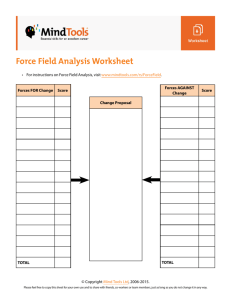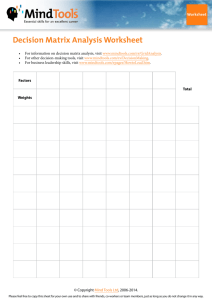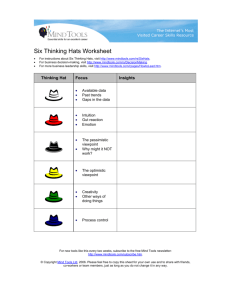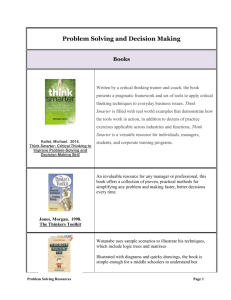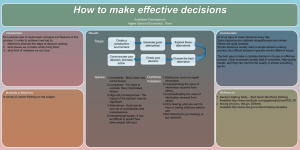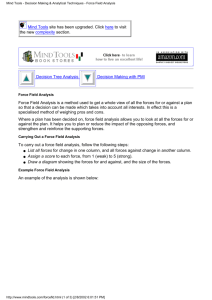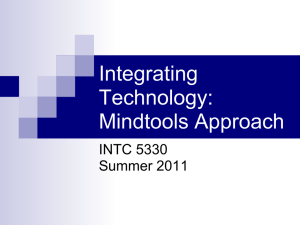Roles of Computers in Instruction
advertisement
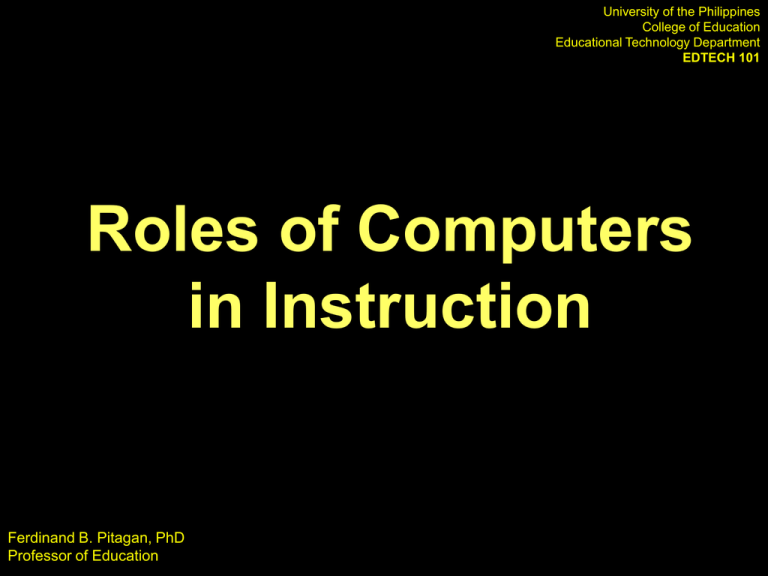
University of the Philippines College of Education Educational Technology Department EDTECH 101 Roles of Computers in Instruction Ferdinand B. Pitagan, PhD Professor of Education Computer for Lecture and Presentation Support Tutoring / Lecturing Use Media; Technologies Some other cases • Lecture Notes http://www.ocwconsortium.org/ • E-learning http://www.ecornell.com/demos/ • M-Learning http://itunes.stanford.edu/ http://subsite.icu.ac.jp/people/koba/JCAI/Welcome.html • WebQuest http://webquest.org/ Useful Websites Providing quality teaching and learning materials Providing training/supporting materials http://www.awesomelibrary.org/ (USA) http://www.nicer.go.jp/ (Japan) http://www.schoolnetindia.com/ (India) http://www.schoolnetafrica.net/442.0.html (African countries – Zimbabwe) http://www.becta.org.uk (UK) Computer as “Communication” Tools Informative Tools : internet resources Constructive Tools : Word; Excel Co-constructive Tools : collaborative learning software Situating Tools : Virtual Reality Computers as Tools of Communication “Computers that connect you to others…” My generation • I need to invite my friends to Friday party.. • When is the due date for this assignment? • Can I get some photos taken during the party? • I’d like to hear experts’ opinions on this issue. • I need to express myself/my feelings somewhere. Card Ask teacher Get film developed Attend conference Video Diary / notes These days Asynchronous Emails Listservs BBS Blogs Voice BBS Synchronous Chat rooms Instant messaging Web-conferencing Mobile phoning 1) Teacher/Expert – Student Communication < Online interactions > ## Using emails, Blackboard announcements, Q & A ## Voice BBS http://subsite.icu.ac.jp/org/jcai/L3/L3-vbbs.html 1) Teacher/Expert – Student Communication < Tele-mentoring (one2one)> Tele-mentoring Young Women in Science, Engineering & Computing http://www.edc.org/CCT/telementoring/ 1) Teacher/Expert – Student Communication < Ask an expert > http://www.k12science.org/askanexpert.html The Center for Innovation in Engineering and Science Education 2) Student – Student Communication < Online discussions > ## Moodle discussions 2) Student – Student Communication < Electronic penpals or “keypals” > ## How People Live in Europe and the Middle East http://www.kidlink.org/KIDPROJ/Euro/ ## Math Pen Pals: Communication Through Numbers Project http://www.kidlink.org/KIDPROJ/Math/pizza.html 2) Student – Student Communication < Individual and cooperative group project > Peace Diaries project Sponsored by the Kellogg Foundation http://www.peacediaries.org/ 3) Learning community Invite those interested in a specific topic (from all over the world), encourage communications, promote learning together 1) Use listserv or Discussion forum (Instructional Technology Forum) http://it.coe.uga.edu/itforum/index.html 2) Professionals’ communities Linkedin --- http://Linkedin.com H-Net -- “H-Japan” http://www.h-net.org/lists/subscribe.cgi?list=H-Japan “To enable scholars, teachers, advanced students, and related professionals to form electronic communities within which they may easily communicate regarding their scholarly, pedagogical, and professional interests” 3) Use Blog http://blog.loaz.com/timwang/index.php/2006/03/21/learning_tools_community_blog_launched Computer as Mindtools for Critical Thinking ♥ Computer As Mindtools Technologies “as knowledge construction tools (Cognitive learning tools; Mindtools) that amplify learners’ abilities…. Mindtools require Critical Thinking evaluation and analyze information connect information/ideas use synthesizing skills imagine process, outcomes, and possibilities elaborate on information add personal meaning to informatio solve problems involve in decision making Computer As Mindtools Mindtools are Cost-efficient and Effort-efficient Mindtools distribute cognitive processing appropriately Mindtools teach new languages Students and technologies can be partners in learning Research says… Greater interaction and collaboration between teachers and students, Curriculum choice and diversity, Improvements in students’ national test scores, behaviour and attendance (Becta, UK 2007) Research says… Promote: Innovative teaching and learning, Constructivist activities among students and Collaboration among teachers (Kozma, 2003 examining 174 cases of school applications of ICT in 28 countries) Research says… Facilitate moves from rote learning and shallow coverage of content--- To the acquisition of such higher order skills as problem-setting, questioning, organizing, evaluating and generating knowledge (Bonk & Zhang, 2008; Jonassen, Howland & Marra, 2007) Examples of Mindtools 1) Survey data – Excel – SPSS for the Social Sciences ) http://Surveyshare.com (Statistical Package Examples of Mindtools 2) Semantic Networks (Concept Mapping Tools) Free online sites http://bubbl.us/edit.php http://www.gliffy.com/gliffy/ Downloads http://www.inspiration.com/ http://www.mindjet.com/ Graphic organizers http://freeology.com/graphicorgs/ http://my.hrw.com/nsmedia/intgos/ht Examples of Mindtools 3) Visualizing tools Google Earth http://www.google.com/educators/p_ear th.html Examples of Mindtools 4) Exploring Microworlds SimCalc Project ------ Calculus concepts / MathWorlds http://www.kaputcenter.umassd.edu/pro ducts/ Examples of Mindtools 5) Mental models using dynamic modeling tools Stella and iThink http://www.iseesystems.com/community /WebSeminars/Dec_10_2008.aspx Computer as an Assessment Tool Managing assessment - Speadsheet (e.g. Excel) - Rubrics - Learning Management System (e.g. Moodle, Blackboard) Large-scale; standardized assessment - Online test (e.g. TOEFL) Performance assessment (over time) - e-Portfolio • Show --- some assessment functions on the Moodle • E-portfolio --- ICU’s E-folio (see http://etec.hawaii.edu/modules/eport/index.html) What is e-Portfolio? “a personal webspace, blog” “a more structured template for collecting and storing coursework and artifacts from other activities, for reflecting on your education, and for showcasing your accomplishments” Why create e-Portfolios? From teachers’ perspective 1) Provide more effective learning supports 2) Align objectives and evaluation From students’ perspective 1) Increase learning effectiveness 2) Model professionalism Any others? 1) Greater accountability 2) Transportability of learning outcomes/credits What are the challenges? 1) Privacy ; plagiarism 2) Time for creation ; technology; authentication; standard…so on 3) Some other issues??? Computer as a Management Tool Manage learning process - show Moodle forum creation and other functions - show Moodle statistics Manage time and schedule - Google Calendar Three Types of Teachers • those who make things happen, • those who watch things happen, • those who say ‘what happened?’ Computer as an Assistive Technology
